Editor's note : Musician Nguyen Tai Tue was born on May 15, 1936 in Thuong Tho village, Thanh Van commune, Thanh Chuong district, Nghe An province. At 9:07 a.m. on February 11, 2022 (ie January 7, 2022 Lunar calendar), he left us while the spring song was still bustling throughout all regions of the country.
On the occasion of the two-year anniversary of the passing of Musician Nguyen Tai Tue, we would like to send to our readers the article " Vi Giam of Nghe An - the cradle that nurtured the lifelong passion for composing music of Musician Nguyen Tai Tue" as a stick of incense to remember him in the lyrical space of spring, like the lyrics in his music.
1.1.
In his teenage years, the passion for composing music in musician Nguyen Tai Tue surpassed other forms of literature and art. From the cradle of the Vietnamese folk songs from his mother's womb, from his beloved hometown of Nghe An to the faltering songs he wrote at the beginning, composing music permeated his brain, his blood, nurturing his sensitive, compassionate and courageous soul. It seemed that the lyrical source accumulated in him trickled out, trickling through the streams and rivers to find the ocean.

Right in Nguyen Tai Tue's early compositions, the lyrical sounds that were extremely close to life resounded, making his mother filled with joy. Just looking at Nguyen Tai Tue's eyes, full of excited memories of his eighties, singing the Nghe-inspired song Ho Dan Cong , composed when he was only fifteen, is enough to see that the flame of passion sparkled and burned without stopping.
Nguyen Tai Tue has the salty, lingering quality of folk music in his soulful, lyrical melodies, avoiding all temporary trends. He is always self-aware, self-filtering, diligently devoting himself to polishing his sound, ignoring the temptations that are difficult to overcome in everyday life.

The public, the audience, the respectable listeners, when enjoying the song Xa Khoi, just let their souls fly and wander with the melody and the lyrical lyrics, but very few people know the endurance of the author of the song when composing this music genre in the late 50s of the 20th century. And, in each song of Nguyen Tai Tue, we are conquered by the profound romantic beauty of a kind, pure and delicate heart with true humanity, for human dignity, always believing in the goodness of life.
No one understands better than Nguyen Tai Tue how he distilled and developed the folk music of the Vietnamese ethnic groups, to bring new works to the world. Nguyen Tai Tue's musical works, with the first steps from "vi" and "giam", have soared very high, standing among the masterpieces of humanity, with romantic lyricism, sophistication, and a very unique beauty that still lingers in the national soul.
Listening to Nguyen Tai Tue's songs, one feels like a dawn with the first gentle and clear rays of sunlight, sometimes a flute sound in the majestic and fresh natural scenery of the highlands, sometimes a sail of clouds is nurturing at the end of the sky. In particular, the beauty of Vietnamese women in Nguyen Tai Tue's music bears the shape of cultural lands: the slender figure of a coastal girl sailing offshore with a nostalgic singing voice full of aspirations for a better future; the feminine and strong beauty typical of a Central Highlands girl with the depth of her human soul and love for the red basalt plateau land; the Thai, Tay, Giay, Cao Lan, Hmong, Nung girls, etc. of the Northern mountains, beautiful and graceful like the petals of the Ban flower; the gentle Southern girls, beautiful like lotus flowers, graceful like the immense singing melodies of the river region; and the beauty of a Hanoi girl, a thousand years of Thang Long, forever beautiful, etc.

From Nguyen Tai Tue radiates in our soul a whole river, a vast sky, a vast ocean of lyricism, romance, the liberal beauty of the multi-colored soul of Vietnamese culture expressed through music. Sparkling in that music are the full moons like the face of Kieu in Nguyen Du's poem, the graceful figure of the beauty in Chinh Phu Ngam Khuc, looming lonely in the immense mulberry fields , the Giay girl barefooted in the clear Muong Hum stream, evoking a folk song in the spring afternoon, etc. Those Vietnamese beauties become immortal beauties, accompanying the nation, going out into the world and connecting bridges of friendship carrying the message of peace.
1.2.
When he believed that he had a real talent for composing music and was determined to pursue this passion to the end, he could not imagine what difficulties and challenges he would encounter on his path. But he defied all difficulties and hardships and persevered on the path he had chosen. He once said in public that if he could start his life over again, he would still voluntarily choose the path of being a music composer, following the path of inheriting and developing the values of Vietnamese folk music. He still chose lyrical, romantic, emotional music, deeply humanistic, with lasting value in both music and literature to create throughout his passionate journey. We were very moved when we heard him summarize and confide in his music composing career during his lifetime:
- My parents wanted me to become an intellectual, a professor of literature. Due to the influence of feudal etiquette, making music in the eyes of my parents and relatives was a "lowly singing" profession. When I embarked on a career in music composition, I had to define my own ideology and consciously face reality. Although the music composition profession was recognized by the state, there was a Vietnam Musicians Association, organized, legal, and valid in all aspects, there were still some prejudices. Those invisible barriers were only broken when a series of works were born that resonated and were remembered by the public. So I plunged into the danger of an adventure of searching for an unpredictable result. A harsh form of creative labor with abstract, invisible, intangible compositional materials. That was sound.

When we asked if a talented musician like him, with a passion for composing and equipped with such a solid theory of composition, would have any difficulties hindering his path to success, he slowly replied:
- I personally encountered a difficulty, which was not being able to self-evaluate the level and stature that I could achieve in creating valuable musical works. Even after finishing a number of valuable works that were recognized by the public, I always questioned my level and talent. Therefore, my works were often written very slowly. While composing, I also tested them in practice to self-filter. I realized that caution towards composers is very necessary.
Today is the second anniversary of his passing, but we still clearly see his elegant face with his wise eyes and gaze, sometimes thoughtful, sometimes serious, and sometimes full of humor. His gaze seemed to penetrate everything. Especially when he sat in front of the faded music sheet with the piano and the pen, his fingers moving as if he were kneading something from the air along with the strange rhythms of sound coming from his mouth, each consonant very clearly heard. Anchoring a musical phrase, he used the pen with clearly selected strokes and ink color to transcribe it. How much soul did those small, strong, elegant musical notes contain? It was impossible to know. There were more souls in sound than in thought. The music pieces are always handwritten by Nguyen Tai Tue with his own musical notation, recording the magical sounds from his mouth, have entered the cultural treasure of the Vietnamese people, resounded on the mass media, and lingered forever.
Source























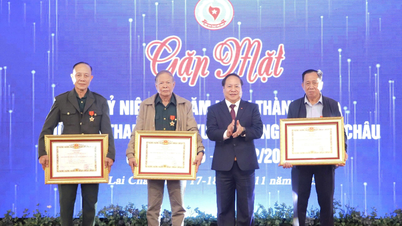


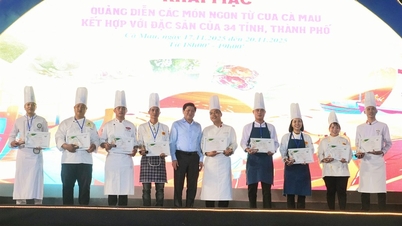

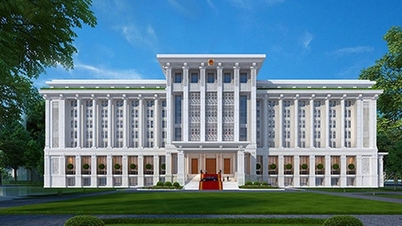



![[Photo] General Secretary To Lam and National Assembly Chairman Tran Thanh Man attend the 80th Anniversary of the Traditional Day of the Vietnamese Inspection Sector](https://vphoto.vietnam.vn/thumb/1200x675/vietnam/resource/IMAGE/2025/11/17/1763356362984_a2-bnd-7940-3561-jpg.webp)






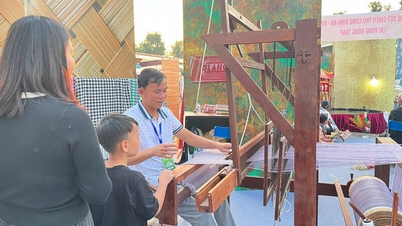

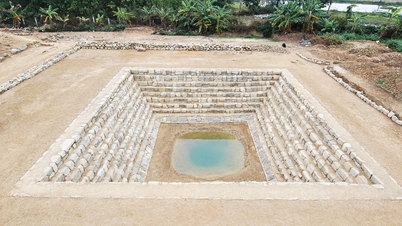








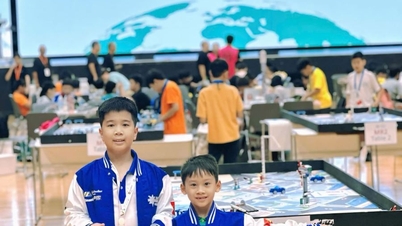





















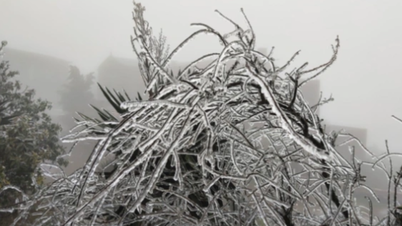
































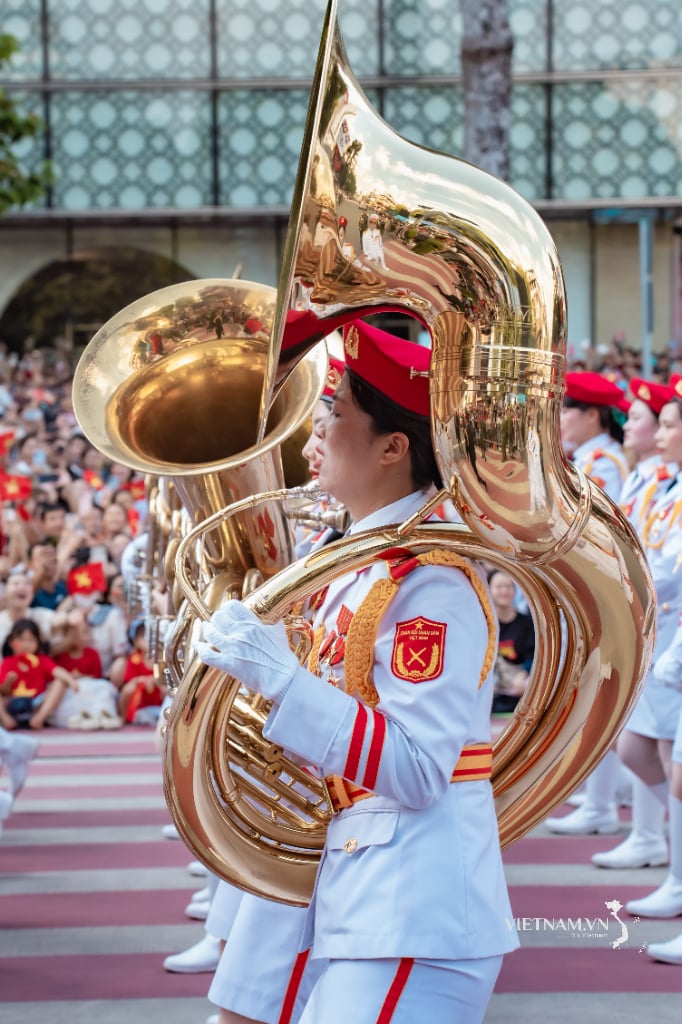
Comment (0)